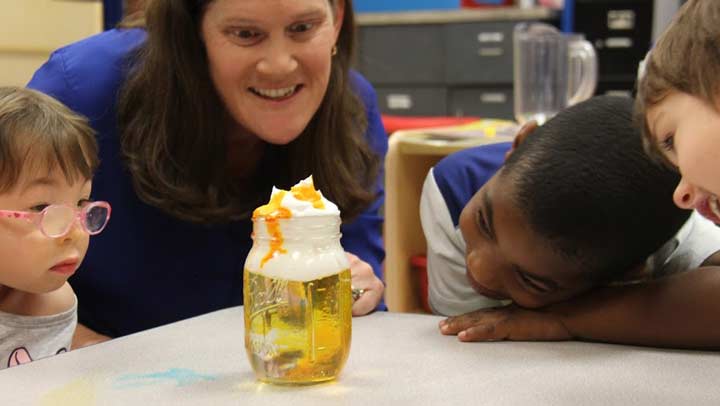
Elizabeth Parameswaran’s UAH Early Learning Center class discuss the water cycle and how a cloud becomes saturated and heavy resulting in rain. Parameswaran earned a Master’s of Education degree with a concentration in Autism Spectrum Disorders this spring.
Photos Courtesy: Elizabeth Parameswaran
An "exceptional experience" as a Special Olympics volunteer altered the course of Elizabeth Parameswaran’s life and cemented a career working with special needs children.
Parameswaran graduates this spring from The University of Alabama in Huntsville (UAH), earning a Master’s of Education degree with a concentration in Autism Spectrum Disorders (ASD).
Born and raised in a small town in Southern Tennessee, she graduated from Shelbyville Central High school as the salutatorian. Before her life-changing experience with the Special Olympics, Parameswaran planned a career in the medical field.
She attended Transylvania University in Lexington, Ky, and graduated summa cum laude with a Bachelor’s degree in Elementary Education. For many years, Parameswaran taught children in inclusive multi-age classrooms. However, the ever-rising rate of Autism Spectrum Disorders (ASD) has created a daunting challenge for teachers and educators everywhere.
"My work at the UAH Early Learning Center (ELC) created graduate school educational opportunities through a degree in Differentiated Instruction with a Concentration in Autism Spectrum Disorders, and culminated in me receiving the Outstanding M.Ed. Teacher Education Award for 2019," she said.
ASD is a range of conditions, which can cause communication challenges, repetitive behaviors, and difficulties understanding and applying social skills. Parameswaran said indicators of autism usually appear by age three, and many adults now receive a diagnosis of ASD due to advancements in medical and societal knowledge and awareness. She noted too, that The Centers for Disease Control and Prevention in Atlanta, GA, estimates that one in every 59 children has a diagnosis of autism, making strategies and challenges of autism essential to every teacher education program.
"Advanced education in autism creates opportunities for educators in a variety of educational settings. However, the inclusionary possibilities for students with special needs and autism provided the basis for my personal motivation. The closeness of traditional learners and learners with special needs working side by side to achieve a common goal is exceptional," she said.
Parameswaran said her educational experience at UAH provided a "plethora" of resources.
"Professors from diverse backgrounds impart wisdom in pedagogies, educational strategies, and teaching methods while peers give insight, advice, and help through online discussion posts," she added. "Mentors at the UAH ELC and within the education department also assisted with professional development along my journey."
As the parent of a child with special needs, Parameswaran said, understanding and support in the educational process always remains a vital concern.
"The knowledge and education attained through this degree creates the ability to give these necessary elements for students with autism in a caring and compassionate way," Parameswaran said. "However, the differentiated instruction component offers strategic implementation opportunities for every student and, therefore, establishes the basis for a successful inclusive environment and educational advantages for every learner."
Implementation of Parameswaran’s UAH graduate degree allows for diversification of education for not only students with ASD, but also every student in the classroom. "Differentiated instruction applies a variety of learning modalities, strategies, and principles, which fulfill the educational needs of individual students while allowing for the full attainment of potential. The focus on ASD prepares instructors to confidently meet the challenges of one of the most commonly diagnosed special needs today," she said.
Parameswaran said the future of special education and autism spectrum disorders remains bright as teacher training and community awareness of the many positive aspects of inclusion increases. "Through newfound knowledge and understanding, one can create a positive learning environment which not only educates, but also empowers all students. As a generation of individuals with autism moves from educational institutions into the work force, society will truly become a fully inclusive environment with respect and acceptance for all people."
Her advice for young people interested in special education as a career is to listen to your heart.
"I have often been told that you don’t go into special education—special education finds you. This has been true of my personal journey as an educator," said Parameswaran. "Those individuals privileged to heed the calling of working with students with special needs must always treat each student as a precious, yet malleable person, full of capabilities, strengths, and potential. Though trials and tribulations will come, remember the words of Michael Oher…"Greatness isn’t defined by what you’ve achieved but by what you’ve overcome to achieve."
Contact
Beth Nason Quick, Ed.D
Dean, College of Education
256.824.2325